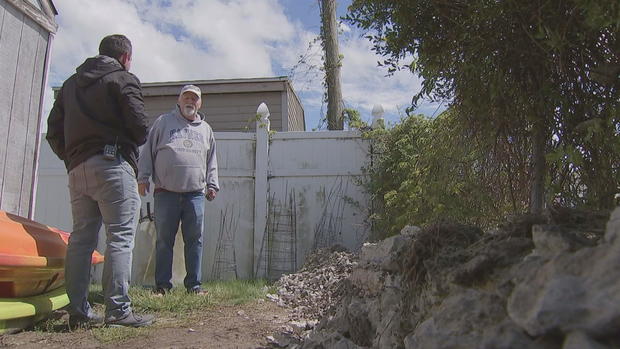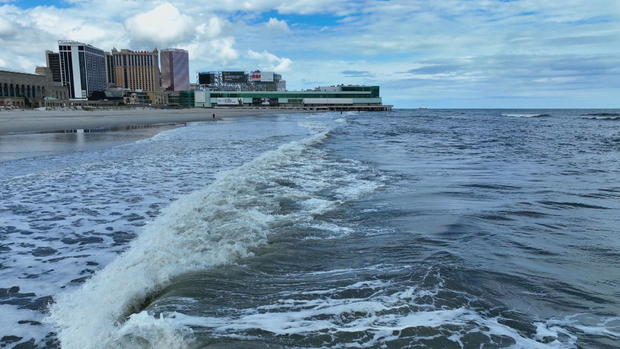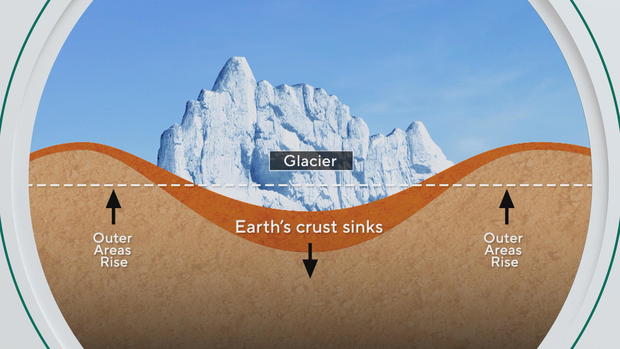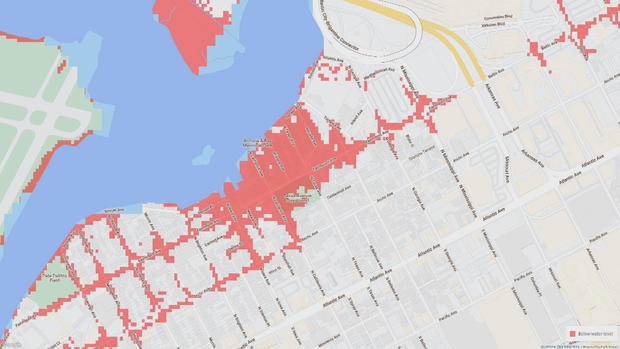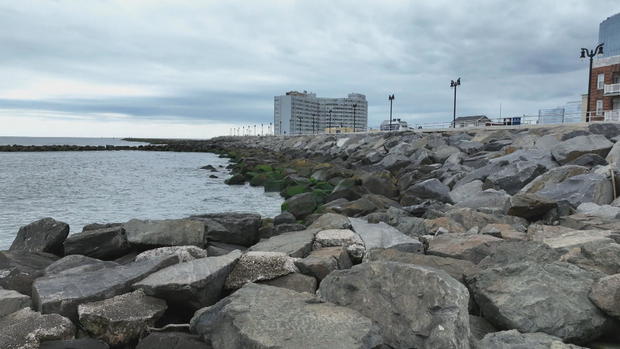Why is Atlantic City's sea level rising much faster than the rest of the world?
ATLANTIC CITY, N.J. (CBS) -- Along Atlantic City's western back bay in Scott Haynes' backyard is an example of his resiliency, anchored in a pile of broken concrete.
"Instead of the cost of having it hauled away, I used it as my makeshift sea wall," Haynes laughed.
It's the cost of having an up-close view of the water.
"On a high tide, I could have [the water] up to, I don't know, say, like a quarter way up the shed," Haynes said. "It just goes right through the yard."
About three to five times a year, whether it rains or not, his street floods, forcing him to move his car to higher ground, but the flooding doesn't dampen his desire to still live in his neighborhood.
"It is what it is. Mother Nature, you can't change her," Haynes said. "She's rough."
But Mother Nature is changing at a rate that could put Haynes' neighborhood permanently underwater because the water is rising.
Climate researchers say between 1911 and 2022, Atlantic City's sea level has risen 18.2 inches, more than double the global average.
The reason is two forces happening at once.
The emissions from cars and factories are changing the climate by trapping in the heat and making the planet warmer.
That melts glaciers, which causes water to rise.
At the same time, Rowan University Professor Andra Garner said Atlantic City's sinking.
In fact, she said it's been sinking ever since the last Ice Age when glaciers used to compress New Jersey's land.
"Kind of like if you put a bowling ball on a mattress," Garner said. "Under the bowling ball, the mattress is going to get squished down, but out at the edges, it gets raised up, and then when you take the bowling ball away, everything comes back to where it was."
Next to Garner's desk is a color-coded yardstick, which shows by year how high the sea could rise as the climate continues to change.
"It kind of puts it into perspective when you can stand that right next to you and see exactly how high those sea levels, how much that sea level rise really looks like," Garner said.
The higher global emissions are, the more the sea rises.
"So, 2100 on our low end is down here, you know, a little under three feet," Garner said. "For the higher end, 2100 is up here closer to four feet."
According to climate maps from the nonprofit Climate Central, if Atlantic City gets three feet of sea level rise, by 2100, Scott Haynes' neighborhood will be below tide level.
"Definitely we need to start thinking about how to make our coasts more resilient," Garner said.
Atlantic City is trying to make itself more resilient.
Jacques Howard is Atlantic City's director of planning and development.
"But the fact is that we are built, and we are the economic engine quite frankly of South Jersey. Most people know that," Howard said. "Consequently, we do need to be resilient."
But resiliency is costly as $100 million dollars is being spent on infrastructure projects throughout the city to mitigate the effects of sea level rise and storm surge.
Those projects include a sea wall, which rings the northern border of the island to protect neighborhoods from higher storm surges, and a new pump station to replace one facing the back bay that was built in the 1900s.
Uzoma Ahiarakwe is Atlantic City's city engineer, and he said sea level rise is preventing rainwater from more effectively flowing out of the city's underground storm drains.
"When ocean rises, it's hard for water to flow out and because it's harder for water to flow out, the run-off backs up," Ahiarakwe said. "When it backs up, it can't collect more water. You start having ponding."
Ahiarakwe said the new station will have bigger pumps to push out stormwater into the back bay.
These projects are expected to defend Atlantic City from storm surges and sea level rise through the end of the century.
The city's also pursuing federal and state funding to give homeowners money to raise their homes.
But until the city gets that money, many homes in Atlantic City, including in Haynes' neighborhood, remain vulnerable to flooding.
"I hope I'm not around," Haynes laughed. "I'll be gone so I'm not worried."
But his children, and his eventual grandchildren, will be around and will have to live with a higher sea level unless, Garner said, efforts are made to reduce global emissions.
"It's easy to feel overwhelmed and kind of depressed about it, but I think there's a lot of hope," Garner said. "We very clearly see more manageable amounts of sea level rise if we work towards really cutting our emissions now."
